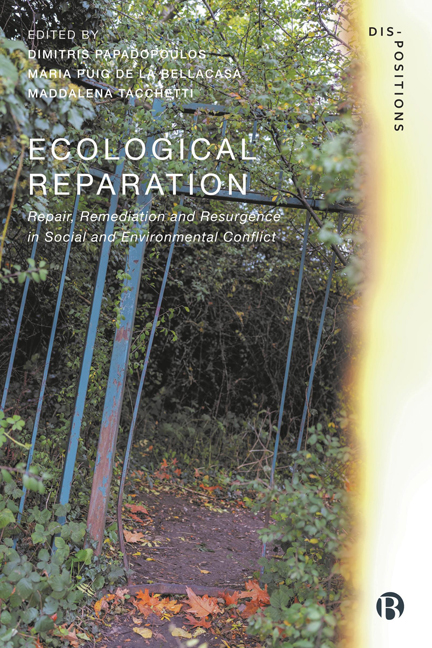Book contents
- Frontmatter
- Contents
- List of Figures
- Notes on Contributors
- Acknowledgements
- Note on the Figures
- Dis-Positions Series Preface
- Introduction: No Justice, No Ecological Peace: The Groundings of Ecological Reparation
- PART I Depletion<>Resurgence
- PART II Deskilling<>Experimenting
- PART III Contaminating<>Cohabiting
- PART IV Enclosing<>Reclaiming Land
- PART V Loss<>Recollecting
- PART VI Representing<>Self-governing
- PART VII Isolating<>Embodying
- PART VIII Growth<>Flourishing
- Index
24 - Algorithmic Food Justice
Published online by Cambridge University Press: 28 March 2024
- Frontmatter
- Contents
- List of Figures
- Notes on Contributors
- Acknowledgements
- Note on the Figures
- Dis-Positions Series Preface
- Introduction: No Justice, No Ecological Peace: The Groundings of Ecological Reparation
- PART I Depletion<>Resurgence
- PART II Deskilling<>Experimenting
- PART III Contaminating<>Cohabiting
- PART IV Enclosing<>Reclaiming Land
- PART V Loss<>Recollecting
- PART VI Representing<>Self-governing
- PART VII Isolating<>Embodying
- PART VIII Growth<>Flourishing
- Index
Summary
Ecological reparation
In recent years, practices of reparation (broadly including maintenance, repair, remediation and regeneration) have become lively sites of scholarly interest in the social sciences, particularly in relation to environmental concerns. Some scholars have critiqued the idea of repair as a framing for ecological reparation, seeing repair as too invested in a return to normative relations that are already broken (Middleton, 2018). Indeed, some have argued that repair and maintenance work can keep orders running long past their end dates, masking and displacing the opportunity for system change and alternative approaches (Ribes, 2017).
For others, the idea of repair still has something to offer. Jackson writes about repair as the kind of hope that we need, as we think from – and respond to – ‘broken worlds’ (Jackson 2014). Henke and Sims disambiguate between forms of repair action: ‘repair as maintenance’ works within existing orders whereas ‘repair as transformation’ brings new configurations into being (2020). Henke and Sims suggest that both are required for repair within the context of the Anthropocene, a recursive idea of ‘repairing repair’ (2020: 122).
What is clear to all interested in reparation, is that when moments of breakdown come under study, they are often revealing: decentring subjects and showing up relations in their complexity, in their fragility and in their ever-changing temporality (Houston, 2017). To study repair is to think about the possibility of action in this moment; to examine decisions that are taken about what endures and what is let go. On the one hand, that might mean thinking about building new orders in the world’s aftermaths: working with the conditions at hand and without the expectation of solutions (Tsing, 2017). On the other, reparation might also mean un-making damaging systems through design for decline (Tonkinwise, 2019; Lindström and Ståhl, 2020).
Algorithmic Food Justice
The politics of ecological reparation is increasingly played out in spaces of anticipatory governance. Here, repairing problems involves the conceptualization of new visions of future systems, in which algorithms increasingly loom large as reparative agents. In the case of smart cities, for example, the responsibility for emissions reduction is delegated to networked infrastructures and Big Data, which are intended to produce carbon efficiencies through real-time data gathering, analysis and control (Gabrys, 2014).
- Type
- Chapter
- Information
- Ecological ReparationRepair, Remediation and Resurgence in Social and Environmental Conflict, pp. 379 - 396Publisher: Bristol University PressPrint publication year: 2023



